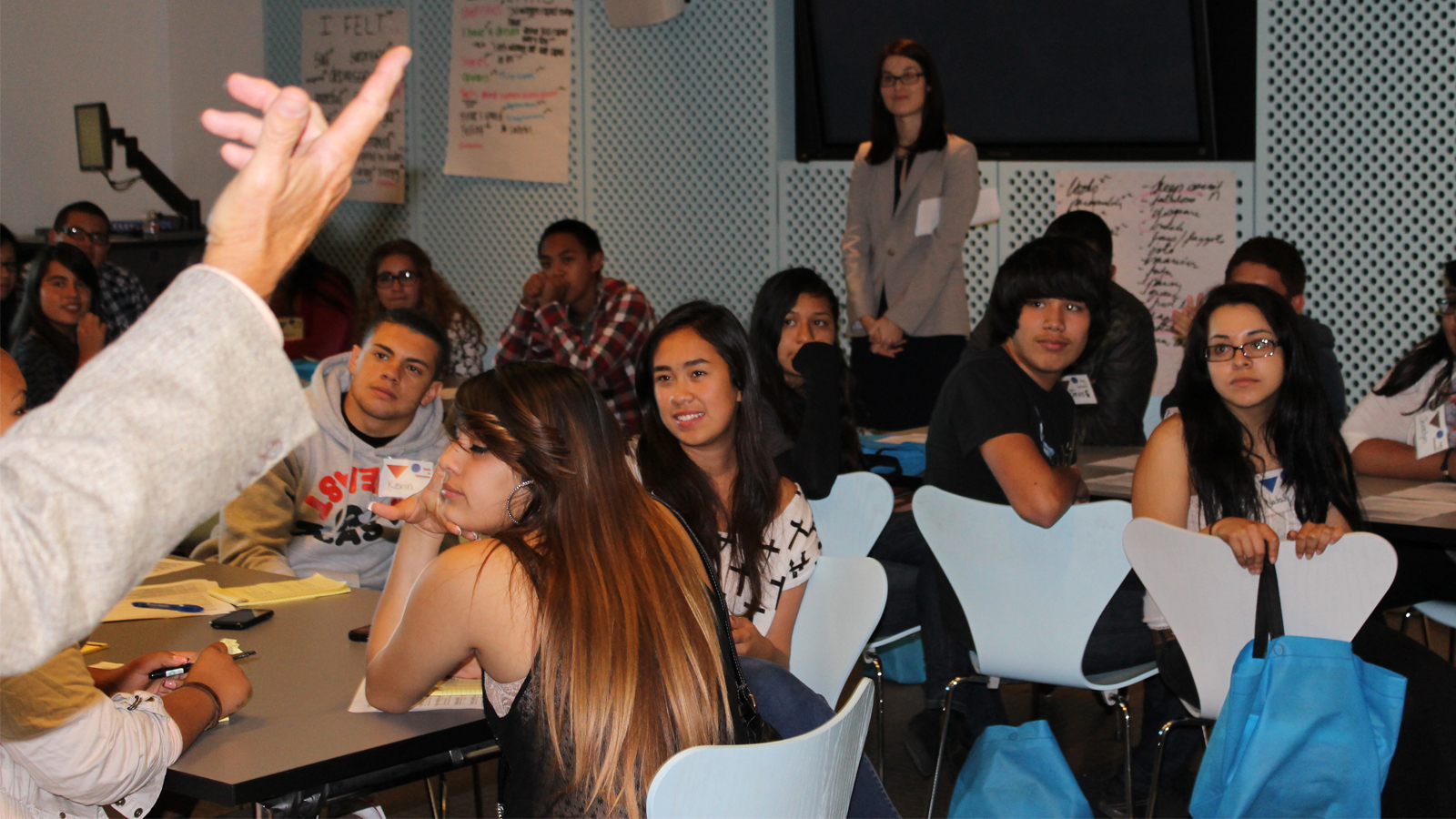Teacher Resources

Mobile Museum of Tolerance (MMOT) workshops are designed to complement existing social studies curriculum. To maximize the MMOT learning experience, we encourage educators to use the following resources to extend the conversation “beyond the bus”:
Teacher’s Guides
Our comprehensive Teacher’s Guides have been developed by expert educators in alignment with state content standards. Each guide contains a detailed step-by-step lesson plan and supplementary materials to engage students in critical thinking and discussion about topics connected to the MMOT workshops.
The Hitler Letter: Understanding the Rhetoric of Hate Anne Frank Story
● Students use the rhetorical concepts of ethos, pathos, and logos to analyze a 1919 letter in which Adolf Hitler calls for “the uncompromising removal of the Jews everywhere”. This lesson emphasizes the power of language as both a weapon for violence and a catalyst for liberation.
Remember the Children: Writing as Resistance to Injustice
● Writing served as a crucial form of resistance for youth during the Holocaust. Using a letter from Bella Blitz and excerpts from the diaries of Anne Frank and Abram Cytryn, this lesson shows students how writing, organizing, telling, and documenting have been used as resistance against injustice.
Media Literacy: Propaganda Techniques in History and Today
● This lesson focuses on developing students’ media literacy by analyzing historical examples of propaganda. Students first learn about the strategies used by the Nazis to recruit young people before reflecting on the prevalence of similar propaganda techniques in contemporary pop culture and social media.
Words Create Our World
● Through the analysis of famous quotes and poetry, students reflect on the power of words in shaping people’s emotions, thoughts, and actions. The lesson culminates in students composing a poem about a social justice concept that personally resonates with them.
Global Hate
● Hate groups, including white supremacists and neo-Nazis, continue to pose a threat in the United States and around the globe. In this lesson, students come to understand how this hateful rhetoric is spread through music and hate symbols.
Peacemakers Phrase Poem
● This lesson serves as a powerful follow-up to an MMOT visit. Taking inspiration from the words of famous peacemakers including Simon Wiesenthal, Martin Luther King Jr., Anne Frank, and the Dalai Lama, students write a phrase poem that reflects on their Museum experience.
Para Todos Los Niños (For all the Children)
● Many people associate the end of school segregation with the 1954 Supreme Court case Brown v. Board of Education, which officially struck down the notion of “separate but equal” schools for African-American and white students. This lesson focuses on another case, Mendez v. Westchester School District, in which a Mexican-American family fought against segregation in California. Students gain a deeper understanding of the contributions of Latinx individuals on the civil rights movement and reflect on the ongoing impact of segregation in modern schools.
Crossing the Line: High School Race Relations and Conflict Resolution
● In this lesson, students learn to apply Dr. Martin Luther King, Jr.’s Six Principles of Nonviolence to addressing race-related conflicts in their schools and communities. Combining artistic expression with critical dialogue, students read an incomplete comic about a racial dispute and propose a peaceful resolution to the story.
The Plight of Refugees
● Students gain an understanding of the hardships refugees face when forced to leave their homes through a variety of interactive activities. The lesson culminates in a debate in which students role-play as community members, government officials, immigrants, and other stakeholders to discuss issues surrounding refugee rights.
Children Who Labor
● Child labor is an ongoing human rights issue that impacts young people around the globe. In this lesson, students learn about the history of child labor and contemporary efforts to combat it, including fair trade and the Convention on the Rights of the Child.
Responsibility: The Ripple Effect
● Several different types of responsibility are defined in this lesson, ranging from personal responsibility to responsibility for one’s family, community, and world. A major emphasis is placed on the interconnected interests of all humans, and students reflect on how they can take responsibility to impact their world in a positive way.
Teaching the Holocaust
As global leaders in Holocaust education, the Simon Wiesenthal Center recognizes the challenges of teaching about this complex topic. The Museum of Tolerance in Los Angeles offers a number of resources to aid educators in discussing the Holocaust with students (click here).
Simon Wiesenthal Center maintains an extensive collection of material related to the Holocaust, including photographs, letters, manuscripts, diaries, and artwork. Our searchable online archives are an excellent resource for teachers seeking primary sources to discuss with their students (click here).
Lesson Plans
This specially designed Guide augments the professional development educator programs at the Museum of Tolerance with resources, lessons plans, and activities to expand the conversations to the classroom and beyond (click here)
Digital Media Literacy: Youth Empowerment Resources
The Simon Wiesenthal Center also provides Digital Media Literacy: Youth Empowerment Resources to inform students and parents about harmful online sites, how to report harassment, as well as websites to promote positive social change (click here).
Guest Speakers
MMOT is privileged to host several guest speakers who are survivors of the Holocaust and other genocides. Guest speakers volunteer their time to discuss their unique experiences with classrooms via video chat. To learn more about hosting a guest speaker in your classroom, please refer to our “Guest Speakers” page.
